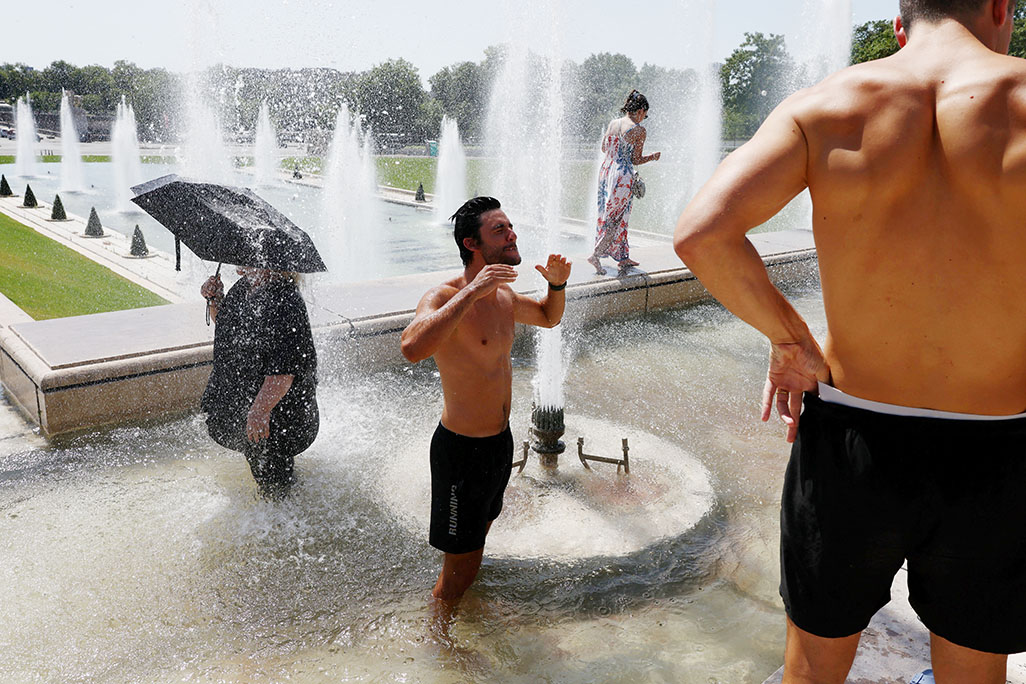Mediterranean Sea temperatures at record highs
Italy banned outdoor work in some regions during the warmest hours, France shut schools and part of the Eiffel Tower and Spain confirmed its hottest June on record as a severe heatwave gripped Europe, triggering widespread health alerts.
The risks of working outside in searing temperatures were highlighted as Spanish trade unions attributed the death of a construction worker near Bologna on Monday to the heat. In Barcelona, authorities were looking into whether the death of a street sweeper over the weekend was also heat-related.
Turkey continued to battle wildfires which forced the temporary evacuation of around 50,000 people on Monday in areas surrounding the city of Izmir, the province of Manisa and Hatay in the southeast.
Europe is the world’s fastest-warming continent, heating up at twice the global average, according to the EU’s Copernicus Climate Change Service, with extreme heatwaves starting earlier in the year and persisting for longer.
“What is exceptional … but not unprecedented is the time of year,” said World Meteorological Organization spokesperson Clare Nullis, adding that extreme heat episodes were seen now “which normally we would see later on in the summer.”
Higher temperatures in the Mediterranean Sea tend to reinforce extreme temperatures over land areas, she said.
The Mediterranean Sea hit a record 30 C (86 F) off Spain, six degrees above the seasonal average, Spanish weather forecaster AEMET said, as a high pressure system trapped hot air above Europe, a phenomenon known as a heat dome.
JUNE A SCORCHER
Spain recorded its hottest June last month, with an average temperature of 23.6 C, AEMET said.
Indeed, for the continent, the month likely ranks among the five warmest Junes on record, Copernicus said. England experienced its hottest June since at least 1884, the Met Office said, citing provisional data.
The Red Cross set up an air-conditioned “climate refuge” for residents in southern Malaga, said IFRC spokesperson Tommaso Della Longa, while in Germany, people hit the ski slopes to avoid heat in the cities.
Extreme heat kills up to 480,000 people annually around the world, according to Swiss Re, which notes this exceeds the combined toll from floods, earthquakes and hurricanes.
The heat was set to peak in France on Tuesday, reaching 40-41 C in some areas, weather forecaster Meteo France said. Nearly 1,900 schools were closed, up from around 200 on Monday.
A Paris-Milan rail service was disrupted because of a mudslide on the French side of the Alps, with full service not expected to be fully restored until mid-July, French rail operator SNCF said.
The top floor of the Eiffel Tower closed on Tuesday and Wednesday, disappointing scores of visitors.
“I tried to get all organised before our departure and the result is nonsense,” said Laia Pons, 42, a teacher from Barcelona who booked Eiffel tickets for her family three years ago.
When temperatures rise, the puddled iron used to build the Eiffel Tower expands in size and tilts slightly, with no impact on its structural integrity, according to its website.
RED ALERTS
Italy, meanwhile, issued heatwave red alerts for 17 cities, including Milan and Rome. In Sicily, a woman with a heart condition died while walking in the city of Bagheria, news agencies reported, possibly of heatstroke.
Scientists say greenhouse gas emissions from burning fossil fuels are a key cause of climate change, with deforestation and industrial practices being other contributing factors. Last year was the planet’s hottest on record.
“We keep hearing about climate change. I think we’re definitely feeling it now,” Omar Bah, a rental company worker said in London, where temperatures hit 32 C. “When I was younger, summer wasn’t like this.”
Across Europe, tourists sought ways to keep cool.
“We woke up as early as possible to get out as early as possible so we can rest during the afternoon,” Susana Leivonen, a 45-year-old from Finland said in Paris. The family were prepared with water and sun lotion, and planned to seek respite in shops.
The scorching temperatures have raised the risk of field fires as farmers in France, the European Union’s biggest grain producer, start harvesting this year’s crop, with many working through the night to avoid peak afternoon temperatures.






Click here to change your cookie preferences